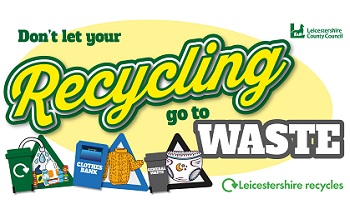How recycling is managed within Leicestershire
March 10, 2021

Further to the TV programme ‘Dispatches’ that was aired on the 8th March 2021 on Channel Four, Leicestershire County Council would like to take the opportunity to clarify the situation in regards to how recycling is managed within Leicestershire.
All recycling collected from Leicestershire households (with the exception of North West Leicestershire who have their own arrangements, please see here; www.nwleics.gov.uk/pages/recycling_containers for further information ) is taken to Casepak, a Materials Recycling Facility (MRF) in Leicester, where it is sorted into the different recyclable streams before being baled and sent for reprocessing into new products.
Information on where the collected recyclables are sent and what the likely end products are is available at www.lesswaste.org.uk/recycle/what-happens-to-your-kerbside-recycling/. Recyclable material is a valuable resource and a competitive marketplace operates worldwide, with different sectors sourcing and purchasing material for a range of reprocessing options.
However, as was highlighted by Dispatches, there are items that residents place in their recycling bins that it is not possible to recycle. In Leicestershire, this is approximately 10% of the total; in 2019/20 this amounted to around 5,500 tonnes. This is made up of items that either should not have been placed in the recycling bin in the first place as they cannot currently be recycled at the kerbside (for example disposable nappies, textiles or food waste) or items which have been contaminated by other items in the recycling, such as full drinks bottles which then ruin other good recyclables.
This material, which is not suitable for recycling, is directed to alternative treatment facilities in accordance with the waste hierarchy, for example to be used as refuse derived fuel. The waste hierarchy ranks waste management options according to what is best for the environment(1) . Disposal (landfill) is considered to be at the bottom of the waste hierarchy (i.e. least preferable), followed by other recovery (e.g. refuse derived fuel or energy from waste), recycling, preparing for reuse and waste prevention (most preferable).
To ensure as much material as possible is recycled we encourage all residents to check with their local district council or here www.lesswaste.org.uk/recycle/items-accepted-for-recycling-at-casepak/ for a comprehensive list of what can be accepted in the kerbside recycling bin. The county and the districts that use Casepak agreed to a single list of items accepted for collection at kerbside. This provides greater consistency for residents within the county for what can and cannot be recycled and is aimed at encouraging everyone to recycle more things, more often.










